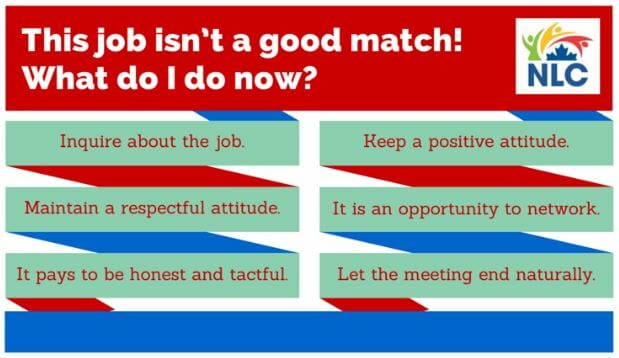So you’re going through your job interview, and everything is going great. Yet halfway through the interview, as the employer proceeds with the specifics of the job, you realize that you are in the wrong place. What do you do?
So you’re going through your job interview, and everything is going great. You’re confident that you’ve given great answers, and you could tell from the interviewer’s facial expressions and body language that you’re going to get a wonderful response. Yet halfway through the interview, as the employer proceeds with the specifics of the job, you realize that you are in the wrong place. What do you do?

1. Inquire about the job.
If the job is not right for you, then you should ask for more clarifications. You need to figure out whether the job really matches your expectations, and have a more detailed conversation with the employer about it. Remember: if in doubt, ask!
2. Maintain a respectful attitude.
Always be polite to the interviewer even if you know deep inside that you won’t take the job offer. Be mindful of your gestures and facial expression; don’t give the interviewer an idea that you are disinterested or distracted with what is being relayed to you.
3. It pays to be honest and tactful.
These two traits always work hand in hand. Master the art of getting your point across without being unprofessional. Pick the things that you want to discuss with your interviewer. Try to explain to him why you’re not the right fit for the job. Similarly, if you think you are not capable of handling late-night shifts, then you should openly tell him that.
4. Keep a positive attitude.
Even if you feel disappointed about the outcome of the interview, remember that you just have to keep your chin up. It pays to be positive each and every time, and it will always reflect on your behavior. The mismatch probably wasn’t a big deal, and it doesn’t mean they are insulting you.
5. Treat the interview as an opportunity to network.
There is always something positive about everything, and even if the interview didn’t turn out as expected, you still were able to connect to other professionals. It pays to have a wide network of contacts; you’ll never know what’s in store for you.
6. Let the meeting end naturally.
Ending the meeting in a positive light might even result in another opportunity that could work for you. A simple “thank you” would do.
You can’t control the outcome, so the best thing to do about it is just to make the most out of things in a positive way. If you think the job being offered isn’t a good fit for you, simply look for one that does.
What are some of your stories?
by Carole Marinier, Blogger for Agilec





